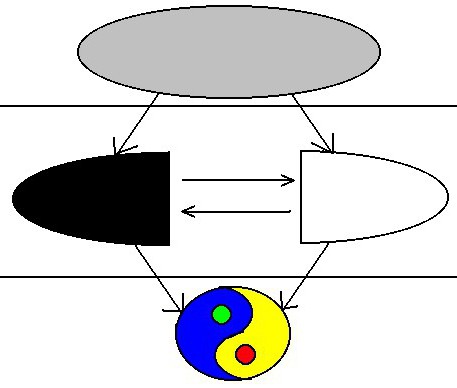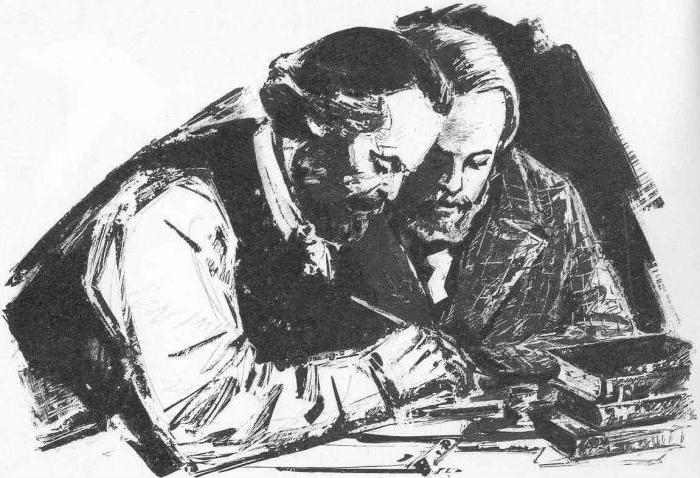The theory of negation of negation (the law of three negatives) is one of the foundations of materialistic dialectics. Thus, the development process is demonstrated and explained in this school of philosophy. It is believed that progressive changes in nature and society occur due to the fact that a certain object falls from one state to another, and from that to the third. And each subsequent status denies the previous one. But at the same time, the third state of the object is similar to the primary one, it only passes this stage at a higher level. It turns out that the “denial of negation” zanon allows you to observe both continuity and innovation. But formulated by German classical philosophy, and then by the founders of dialectical materialism, this concept was already widely criticized at the beginning of the twentieth century.

Why is he called that?
So all development is movement. But why is this type of modification of an object or phenomenon in the philosophy of dialectical materialism called "negation of negation"? The fact is that by this category we mean the state acquired by the object during development. As a rule, any object changes to such an extent that over time it becomes, as it were, the opposite of itself. This quality is called “denial”. Dialectical philosophy considers such a stage inevitable. But if this denial ends with the death (disappearance, destruction) of an object or phenomenon, then such a process can hardly be called development. But when the object continues to modify further, then there is a dialectical negation of the negation.
Spiral movement
Materialist philosophy believes that development occurs due to the destruction of a certain part of the properties of an object or phenomenon. According to the theory of progress, these are qualities that cease to be useful or even hinder further change for the better. The law “negation of negation” in philosophy tells us that the properties that determine the existence of this subject at a given time, or form its new capabilities, are preserved. What happens then? Double negation, at first glance, takes the object back. Every third phase of this process formally resembles the first. But development and progress leads to the fact that this return is actually a turn of movement at a higher stage. Therefore, it is often said that the negation of negation is a spiral modification.

Sense of development
What role does this law play in the philosophy of dialectical materialism? First of all, he demonstrates the connection between the past and the future. In the process of development, various states of an object or phenomenon struggle with each other, and also mutually flow into each other. Every quality is born, fulfills its role, “grows old” and disappears, giving way to others. The law of negation of denial determines development trends, describing the destruction of past, lost utility, properties and the acquisition of new ones necessary for further existence, but opposite to the first. So from the simple, the complex appears. However, this formula itself is difficult to comprehend right away, since spiral development is a very long process. As a law, it is visible only in a more or less complete version, when there are already certain final results. At the various stages of this translational movement, it can only be distinguished as a trend.
Traditions and Continuity
In addition, dialectical materialism in the wording of this law defines categories such as old and new. Necessarily dies away everything that inhibits the development process, leads it to a standstill or to stagnation. In this case, the initial state of the entire past system is destroyed. What is born is that which makes it possible to live and function further, to adapt to new circumstances, to change and enrich the potential. Denial of negation leads to the resolution of contradictions, which is called "withdrawal." In this process, the old is replaced by the new.

Denial and Contradiction
Dialectical philosophy assumes that in the very object, phenomenon or cognizing subject, an inner opposition is embedded. In the process of activity, she comes to light and begins to deny herself. Any form, result and direction of development shows us this process, which has already been compared above with the image of a spiral. Moreover, it is believed that in such a movement, the law of negation of negation determines not only the type, but also the time of change. "Spiral" is directly related to the acceleration of development, the periods of which are progressing faster with each new stage. That is, in the dialectical concept of “negation” there is also a positive meaning. It stores a certain moment of connection between the various stages of the process.
Classical dialectic
For the first time Hegel formulated the law of "negation of negation" in philosophy. He proved it with examples from the history of thinking. The development of any concept takes place as a movement from the abstract to the concrete. In this process, an internal contradiction of the concept is resolved. It goes to the stage of its other being, turning into something else than it was before. Then it “returns to itself”, but already in the form of a concrete concept, which contains both its former, abstract essence and the new, acquired in the process of self-alienation. In The Science of Logic, Hegel even described the law of negation of negation as a universal form of unity of contradictions (their transition into each other) and the struggle between them (split of the whole).
It can be said that this is a special form of another dialectical concept. This is a kind of law on the unity and struggle of opposites. But the philosopher limited the action of dialectics only to the field of concepts and their formation. Indeed, for him, being and thinking were a single whole, while the former was derived from the latter. Accordingly, the triad of denials was the stages of development of the world mind.

Engels on denial
Materialist dialectics extended this Hegelian law not only to the development of spirit and thinking, but to nature and society. Its creators even claimed that they turned the philosophy of the German classic upside down. Friedrich Engels very highly placed the law of negation of negation in philosophy. It can be said briefly that he characterized it as a combination of progression, repeatability and spirality. Engels called it the third law of dialectics. First of all, it comes to light in human knowledge. The development of the latter occurs in the process of replacing some theories with others, the birth of new concepts that are more suited to the changing world and our perception of the universe. But any teaching that denies the past not only criticizes it, but partially includes some amount of its knowledge.
The Law of “Denial of Denial": Examples
Engels argued for this dialectical theory with various arguments. Including he illustrated it with examples from logic and mathematics. Every statement goes through the following stages of development:
- Something is true.
- This is not true.
- The previous statement is false.
It turns out that in this logical chain there is a return to the first sentence. Even Engels, proving the law of "negation of negation", gave examples from the field of mathematics. He said that the opposite of a positive number is the “minus” digit.But what will happen if we subject it to denial? Multiplying it by the same number with a minus, we get the same value in a positive form, but squared (that is, at a higher stage).
Does this law appear in other areas?
Since materialist dialectics is based on the fact that its principles act both in cognition and thinking, and in being (including social), this provision also applies to the law of “negation of negation”. Philosophers who shared her examples cited from various fields of science. For example, from biology. The death and appearance of blood cells, which occurs every day in our body, is a denial and rebirth of previous forms. The change in taste and style preferences in music, art and culture often takes place in a spiral, with a return to the old, but at a new level. Therefore, retro style is so often fashionable. Children are the denial of parents, and at the same time a continuation of them. Moreover, dialectical materialism presupposes a formational approach to the development of society. He argues that the historical process is also spiral and progressive. The change of formations is both a denial of the previous one and continuity. The "removal" of the contradictions can occur through evolution or a violent change of order.

Disclaimer and observations
The theory of negation of negation (the law of three negatives) in the twentieth century has become the object of criticism from various philosophers. The main opponent of this concept was Karl Popper. He was an opponent of the dialectical method even in logic and thinking, not to mention the natural sciences or social trends. First of all, he says that the conceptual apparatus of dialectical materialism is constructed in such a way that levels out any criticism and politicizes it. Supporters of the law of negation of negation interpret its application too arbitrarily, and it is impossible to verify this. These ideas cannot be developed, and this leads to stagnation and stagnation of any philosophical thought.
Why this law is not scientific - criticism of dialectics
Popper says that Marxism as a method was good for the nineteenth century as one of the positivist theories. But when his supporters turned dialectical materialism into dogma, then he ceased to be a science in the strict sense of the word. Other critics believed that this theory itself constructs its own evidence, and does not take it from experience or the laws of thought. In addition, if the law of three negatives made sense to Hegel, since in his conception he determined the development of the spirit (roughly speaking, the evolution of God), and therefore there was a goal-setting in this process itself, then for materialists and atheists the inevitability of progress is very strange. It turns out that the “end of history” with the advent of “heaven on earth” is predetermined and inevitable. But the reasons for this are completely unclear.